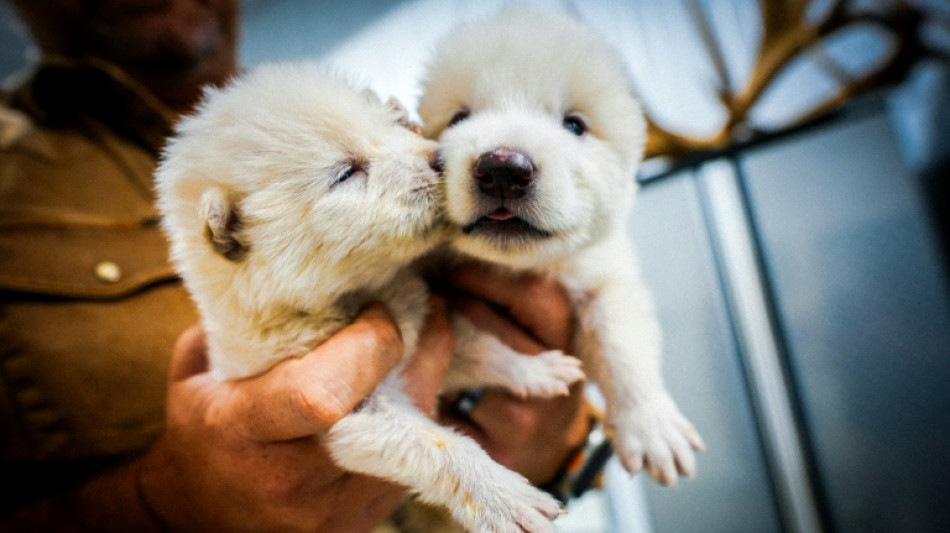
-
 Asia markets fluctuate as investors mull Trump-Xi talks
Asia markets fluctuate as investors mull Trump-Xi talks
-
Trump, Xi ease fight on tariffs, rare earths

-
 Volkswagen posts 1-billion-euro loss on tariffs, Porsche woes
Volkswagen posts 1-billion-euro loss on tariffs, Porsche woes
-
'Fight fire with fire': California mulls skewing electoral map

-
 Fentanyl, beans and Ukraine: Trump hails 'success' in talks with Xi
Fentanyl, beans and Ukraine: Trump hails 'success' in talks with Xi
-
'Nowhere to sleep': Melissa upends life for Jamaicans

-
 Irish octogenarian enjoys new lease on life making harps
Irish octogenarian enjoys new lease on life making harps
-
Tanzania blackout after election chaos, deaths feared

-
 G7 meets on countering China's critical mineral dominance
G7 meets on countering China's critical mineral dominance
-
Trump hails tariff, rare earth deal with Xi

-
 Court rules against K-pop group NewJeans in label dispute
Court rules against K-pop group NewJeans in label dispute
-
India's Iyer says 'getting better by the day' after lacerated spleen

-
 Yesavage fairytale carries Blue Jays to World Series brink
Yesavage fairytale carries Blue Jays to World Series brink
-
Bank of Japan keeps interest rates unchanged

-
 Impoverished Filipinos forge a life among the tombstones
Impoverished Filipinos forge a life among the tombstones
-
Jokic posts fourth straight triple-double as Nuggets rout Pelicans

-
 UN calls for end to Sudan siege after mass hospital killings
UN calls for end to Sudan siege after mass hospital killings
-
Teenage Australian cricketer dies after being hit by ball

-
 As Russia advances on Kupiansk, Ukrainians fear second occupation
As Russia advances on Kupiansk, Ukrainians fear second occupation
-
Trade truce in balance as Trump meets 'tough negotiator' Xi

-
 China to send youngest astronaut, mice on space mission this week
China to send youngest astronaut, mice on space mission this week
-
Yesavage gem carries Blue Jays to brink of World Series as Dodgers downed

-
 With inflation under control, ECB to hold rates steady again
With inflation under control, ECB to hold rates steady again
-
Asia stocks muted with all eyes on Trump-Xi meeting

-
 Personal tipping points: Four people share their climate journeys
Personal tipping points: Four people share their climate journeys
-
Moto3 rider Dettwiler 'no longer critical' after crash: family

-
 US economy in the dark as government shutdown cuts off crucial data
US economy in the dark as government shutdown cuts off crucial data
-
Trump orders nuclear testing resumption ahead of Xi talks

-
 'Utter madness': NZ farmers agree dairy sale to French group
'Utter madness': NZ farmers agree dairy sale to French group
-
Samsung posts 32% profit rise on-year in third quarter

-
 30 years after cliffhanger vote, Quebec separatists voice hope for independence
30 years after cliffhanger vote, Quebec separatists voice hope for independence
-
Taxes, labor laws, pensions: what Milei wants to do next

-
 South Sudan's blind football team dreams of Paralympic glory
South Sudan's blind football team dreams of Paralympic glory
-
US says 4 killed in new strike on alleged Pacific drug boat

-
 What we do and don't know about Rio's deadly police raid
What we do and don't know about Rio's deadly police raid
-
'They slit my son's throat' says mother of teen killed in Rio police raid

-
 Arteta hails 'special' Dowman after 15-year-old makes historic Arsenal start
Arteta hails 'special' Dowman after 15-year-old makes historic Arsenal start
-
Google parent Alphabet posts first $100 bn quarter as AI fuels growth

-
 Underwater 'human habitat' aims to allow researchers to make weeklong dives
Underwater 'human habitat' aims to allow researchers to make weeklong dives
-
Maresca slams Delap for 'stupid' red card in Chelsea win at Wolves

-
 'Non-interventionist' Trump flexes muscles in Latin America
'Non-interventionist' Trump flexes muscles in Latin America
-
Slot defends League Cup selection despite not meeting 'Liverpool standards'

-
 'Poor' PSG retain Ligue 1 lead despite stalemate and Doue injury
'Poor' PSG retain Ligue 1 lead despite stalemate and Doue injury
-
Liverpool crisis mounts after League Cup exit against Palace

-
 Kane scores twice as Bayern set European wins record
Kane scores twice as Bayern set European wins record
-
Radio Free Asia suspends operations after Trump cuts and shutdown

-
 Meta shares sink as $16 bn US tax charge tanks profit
Meta shares sink as $16 bn US tax charge tanks profit
-
Dollar rises after Fed chair says December rate cut not a given

-
 Google parent Alphabet posts first $100 bn quarter as AI drives growth
Google parent Alphabet posts first $100 bn quarter as AI drives growth
-
Rob Jetten: ex-athlete setting the pace in Dutch politics


US firm says it brought back extinct dire wolves
They whimper, drink from baby bottles and crawl oh so tentatively -- they look like cute white puppies, not the fruit of a daring project to resuscitate an extinct species.
A Texas startup called Colossal Biosciences made a big splash this week by releasing footage of canines they say are dire wolves, a species that vanished more than 12,000 years ago.
"For the first time in human history, Colossal successfully restored a once-eradicated species through the science of de-extinction," the company states on its website.
Photos and video of these critters have flooded social media and shaken the scientific community, which has reacted with a mix of enthusiasm and skepticism over this experiment reminiscent of "Jurassic Park" -- the fictional story of a quirky rich man's attempt to bring back the dinosaurs.
The company says it did it by tweaking the DNA of a modern-day gray wolf with carefully chosen genes from dire wolf fossils. This modified genetic material was then inserted in a grey wolf egg and implanted in a common dog as a surrogate mom.
The result: three baby dire wolves, Colossal Biosciences claims.
"I think the claims are vastly overblown," Alan Cooper, an evolutionary molecular biologist who took part in a previous study of dire wolf DNA, told AFP.
"It would be like me putting a couple of genes into you from Neanderthals that made you extra hairy and grow more muscles, and then called you a Neanderthal," said Cooper.
"That's a million miles from Neanderthal. It's a hairy human."
"This is not the dire wolf. This is something they have created that has phenotypic characteristics of dire wolf,” said Lisette Waits, an ecologist and professor of wildlife resources at the University of Idaho.
Waits, who has worked extensively on grey wolf genetics and red wolf conservation issues, nonetheless called this achievement a breakthrough.
The pups are named Romulus and Remus, in a nod to the twin brothers of Roman mythology, and Khaleesi, of "Game of Thrones" fame.
- Debate -
The Colossal Biosciences team studied DNA from two dire wolf fossils -- a tooth from 13,000 years ago and a skull fragment dated back 72,000 years -- and compared them to the DNA of the gray wolf, a species that is alive and well.
The team concluded these two kinds of DNA are around 99.5 percent identical, Beth Shapiro, the company's chief science officer, told AFP.
An analysis of the differences between the two kinds of DNA determined which genes could be responsible for the dire wolf's size, muscle structure and its white fur.
With this information the team modified blood cells from a grey wolf by inserting some of those dire wolf genes. A total of 20 changes were made using the genetic manipulation technique known as Crispr-Cas 9, which is also used in human genetics.
The blood cells were then transferred to a gray wolf egg cell that was implanted in a dog. The results: Romulus, Remus and Khaleesi.
Whether these animals are actual dire wolves or simply genetically modified gray wolves, Shapiro insisted, "is a semantic, philosophical argument."
She added that it will never be possible to create an animal that is 100 percent genetically identical to a species that is extinct.
"But neither is that the goal. Our goal is to create functional equivalents of those species,” the scientist said.
- Dodos and wooly mammoths -
The company plans to apply this technique to dodo birds and woolly mammoths.
Just last month it released photos of mice injected with genetic material from one of those extinct pachyderms, yielding controversy and some very furry rodents.
Some scientists say the goal of recreating extinct species is unattainable and even dangerous. But others welcome it as an ambitious way to fight the planet's steady loss of biodiversity.
Waits, the conservation specialist, said that aside from the hoopla over this experiment this technique could help endangered species recover.
Colossal Biosciences has managed to lure more than $200 million in investment money, which would be a very tall task for other conservation causes, she added.
Ronald Sandler, a professor of philosophy and ethics at Northeastern University, said he worries this technique might lead to "moral distraction" away from the causes of animals going extinct, like climate change and habitat loss.
L.Maurer--VB




